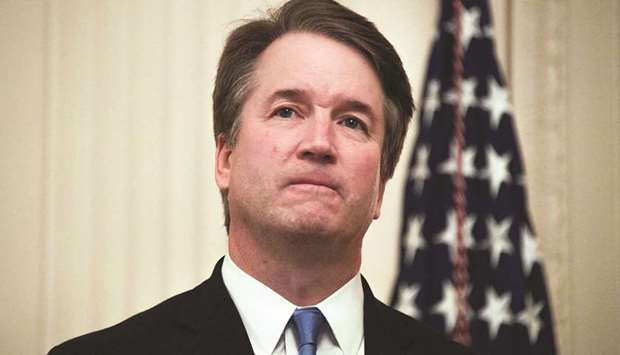Moving beyond a ferocious confirmation battle that divided the country, Brett Kavanaugh got down to business as a US Supreme Court justice yesterday and took an active role in arguments alongside his eight new colleagues on his first day on the job.
He asked several questions during lively oral arguments involving a federal sentencing law for repeat offenders, three days after being confirmed by the Republican-led Senate despite being accused of sexual assault.
Appointed by President Donald Trump, Kavanaugh’s confirmation cemented a conservative majority on the court that could last for years.
He took his seat at the right end of the mahogany bench in the ornate courtroom, wearing traditional black robes like the other justices.
Retired justice Anthony Kennedy, the 82-year-old jurist who Kavanaugh replaced, was in the courtroom, as were members of the new justice’s family.
With police standing by, a handful of protesters gathered outside the Supreme Court building, holding signs saying “Shame” and “He sits on a throne of lies” while chanting “This isn’t over, we’re still here”.
There were no disruptions by protesters during the oral arguments, with security tight in the courtroom.
Before the arguments began, Chief Justice John Roberts welcomed Kavanaugh, 53, to a court that now has five conservative members and four liberals.
Kavanaugh could serve for decades in the lifetime job.
“We wish you a long and happy career in our common calling,” Roberts said.
Kavanaugh was quick to weigh in, asking his first question of a lawyer representing a defendant about 20 minutes into the first argument.
He ended up asking questions of lawyers on both sides during two cases argued before the justices.
Yesterday’s cases involved the 1984 Armed Career Criminal Act, a “three-strikes-and-you’re-out” criminal sentencing law that boosts prison sentences after multiple violent felonies or drug offences.
The cases challenge the types of crimes that qualify as violent felonies under that law and can lead to 15-year mandatory minimum sentences for a defendant.
The cases concerned a Florida robbery conviction and burglary convictions in Tennessee and Arkansas.
Kavanaugh’s confirmation gave the Republican president a major political victory ahead of crucial November 6 congressional elections, with Trump’s second selection for the nation’s highest judicial body.
Conservative Justice Neil Gorsuch joined the court last year.
Trump said on Twitter yesterday that he was “very proud” of Kavanaugh and his family, and disparaged the anti-Kavanaugh protesters.
The bitterly divided US Senate voted 50-48 on Saturday to confirm Kavanaugh, with one Democrat supporting him.
Kavanaugh’s nomination had appeared safe until Dr Christine Blasey Ford, a university professor in California, last month went public with allegations that Kavanaugh had sexually assaulted her in 1982 when they were high school students in Maryland.
Two other women also accused Kavanaugh of sexual misconduct dating to the 1980s.
Kavanaugh denied the allegations and during a Senate hearing on September 27 accused Democrats of an “orchestrated political hit”.
He later wrote in a newspaper opinion piece that he regretted some of his comments.
However, critics said Kavanaugh’s demeanor before the Senate Judiciary Committee raised questions about his temperament and potential political bias in deciding cases.
Kavanaugh moved to the Supreme Court after spending 12 years as a judge on the influential US Court of Appeals in Washington, building a conservative judicial record.
Before hearing arguments yesterday, the justices turned aside appeals of a 2017 ruling authored by Kavanaugh on the lower court that struck down a 2015 environmental rule imposed under former president Barack Obama regulating a potent greenhouse gas linked to climate change.
The appeals were brought by an environmental group and companies that supported the rule, which had limited hydrofluorocarbons used in a variety of products including spray cans and air conditioners.
Kavanaugh is expected to push the court further to the right as he is replacing Kennedy, a conservative who sometimes voted with the liberal justices on key social issues including in cases involving abortion and gay rights.
He can be expected to cast crucial votes on those issues as well as gun control, immigration, voting rights and others.
His views on presidential powers could be tested within days in a dispute over whether Commerce Secretary Wilbur Ross should submit to questioning by lawyers suing the Trump administration over a decision to add a controversial citizenship question to the 2020 census.

Kavanaugh: Although the Senate confirmation process tested me as it has tested others, it did not change me.
